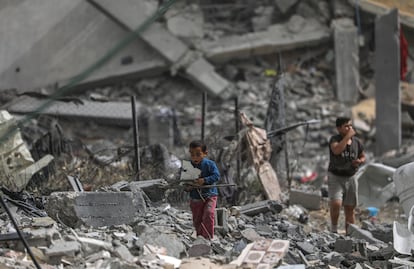Israel deploys soldiers and weapons to Gaza border ahead of its possible offensive in Rafah
U.S. and Israeli representatives discuss plans for that city, the only one ground troops have not entered, as military retaliation against Iran remains up in the air


Israel is beginning to show signs that its next military moves in Gaza are coming. According to the daily Ma’ariv, the army has deployed artillery units and armored personnel carriers in the south of its territory, next to Gaza’s borders. The Israeli press has been linking this troop movement to the announced ground offensive in Rafah, the southern town where more than 1.4 million of the 2.2 million Gazans are sheltering and the only Gaza city that ground troops have not yet entered. Senior U.S. and Israeli representatives will hold a virtual meeting on Thursday to specifically discuss plans regarding Rafah, the White House has confirmed.
These new steps come after Israel’s open front in the country’s north experienced a brief period of calm last week, coinciding with the Eid al-Fitr holiday, which closes the holy month of Ramadan. On Wednesday, that short-lived respite gave way to an attack in which Israel suffered some of the most casualties it has sustained in the more than six-month-long Gaza war. A Hezbollah Shiite militia-party drone bombed an Israeli reconnaissance company in the Bedouin village of Arab Al Aramshe in northern Israel, injuring 14 military personnel and four civilians. This Thursday, commanders of Israeli troops stationed in the north of the country met with local officials and local military to “increase their preparedness” in that region, according to the newspaper Haaretz. Overnight, Israeli warplanes attacked Hezbollah positions on Lebanon’s southern border.
Meanwhile, the Israeli military response to last Saturday’s attack by nearly 300 Iranian drones and missiles is still up in the air. On Thursday, Israeli sources told ABC News that Israel prepared and then aborted retaliatory strikes against Iran on at least two nights this week. An unidentified senior U.S. official described it as “unlikely” that Israel would carry out an attack against Iran until after the Passover vacation, which ends on April 29 this year.
On Thursday, Iran warned about one of the possible targets of an Israeli military attack: its nuclear program facilities, according to the Tasnim Revolutionary Guard agency. Tehran claims that the purposes of that program are exclusively civilian. The West has always feared that the country might acquire atomic weapons—Israel already has them—and has therefore imposed sanctions. The commander of the Revolutionary Guard responsible for protecting these facilities has warned of a possible revision “of the Iranian nuclear doctrine” in case such an attack becomes a reality, in a likely allusion to the development of atomic weapons.
Israeli military retaliation against Iran is a foregone conclusion, although its scope is unknown. After having failed to convince Prime Minister Benjamin Netanyahu not to respond to the Iranian aggression, the United States and other Western allies are now trying to minimize it. This Thursday, Israeli Defense Minister Yoav Gallant visited the Tel Nof military air base in the center of the country to congratulate the pilots who took part in intercepting the Iranian attack. There, he defended Israel’s “freedom of action to do as it sees fit.”
The Israeli government has also taken steps that indicate that the international community has failed to impose a red line on its ground offensive in Rafah, in southern Gaza. “The broad outlines of the operation” to invade this city close to the border with Egypt have already been approved by the General Staff and by Minister Gallant, Ma’ariv announced.
The possible invasion of Rafah could become a bargaining chip related to the retaliation against Iran, the London-based Arab daily Al Araby Al Jadeed said on Thursday. This publication quotes an Egyptian source who claims that Joe Biden’s administration has accepted the Israeli plan to invade Rafah in exchange for the Jewish state not carrying out a large-scale attack against Iran. This Thursday, an Israeli delegation will discuss this offensive with a U.S. delegation in a virtual meeting that will continue the talks held on April 1. It will be a high-level meeting, headed on the US side by National Security Advisor Jake Sullivan and White House Middle East envoy Brett McGurk, while on the Israeli side it will be chaired by Strategic Affairs Minister Ron Dermer and National Security Advisor Tzachi Hanegbi, Haaretz says.
According to the newspaper, which quotes a Washington official, the US is looking for alternatives to the Israeli offensive in Rafah. However, the latest troop movements, the purchase of 40,000 tents, the call-up of thousands of reservists for “operational activities on the Gaza front” and the defense minister’s meeting on Monday to “discuss a series of measures in preparation for operations in Rafah” all suggest that the government is not abandoning its intention to invade the city. As he claimed before of the north and center of the Gaza Strip, Netanyahu now says that the leaders and four Hamas battalions are hiding in Rafah and that 133 hostages are still being held there. Many of them are believed to be dead.
The Israeli army has not yet entered the city but is constantly shelling it. Eleven Palestinians have been killed in Gaza in early morning air strikes, including five children in Rafah.
More sanctions
Since Netanyahu announced last week that this operation already had a date (without revealing it), the diplomatic context has changed markedly in the prime minister’s favor. Before the Iranian missile and drone attack on Saturday night, the United States had shown signs of irritation with the Israeli government over the attack that killed seven aid workers from the NGO World Central Kitchen on April 1. Biden had also made the Rafah offensive conditional on his ally presenting him with a credible plan for the evacuation and protection of civilians. Other Western governments and humanitarian organizations had urged Israel to halt the invasion in a place where the original population of some 250,000 has increased nearly sixfold with the arrival of those displaced by the war.
The Iranian barrage changed everything. Criticism of Israel then turned to declarations of “unwavering” support from Washington even before Tehran began launching its drones and missiles. In the eyes of its main ally, Israel is now back in the advantageous position it occupied just after the Hamas attack of October 7 that killed 1200 people: that of a country that is the victim of aggression and is defending itself. This advantageous position, which it had been losing due to the war in Gaza and almost 34,000 killed there—according to Gaza’s Ministry of Health of the Strip—has returned accompanied by an unexpected bargaining chip: the possibility of obtaining diplomatic and strategic advantages due to the U.S. and other countries’ fear that an Israeli reprisal might unleash a war in the Middle East.
Biden has told Israel that he will not support it in a direct attack against Iran. With the ongoing war in Gaza and the Lebanon front threatening to escalate, Israel has no interest in starting a war with an adversary that, while militarily inferior, is nonetheless militarily capable. Even so, the country is playing the containment card well. On Thursday, the United States announced new sanctions against 16 Iranian individuals and two entities involved in missile and drone production, including several members of the Revolutionary Guard and the Iranian Defense Minister, Macarena Vidal Liy reports from Washington. The United Kingdom has also announced sanctions against 13 senior Iranian officials, while the EU and the G7 are evaluating new economic measures against Iran.
Sign up for our weekly newsletter to get more English-language news coverage from EL PAÍS USA Edition
Tu suscripción se está usando en otro dispositivo
¿Quieres añadir otro usuario a tu suscripción?
Si continúas leyendo en este dispositivo, no se podrá leer en el otro.
FlechaTu suscripción se está usando en otro dispositivo y solo puedes acceder a EL PAÍS desde un dispositivo a la vez.
Si quieres compartir tu cuenta, cambia tu suscripción a la modalidad Premium, así podrás añadir otro usuario. Cada uno accederá con su propia cuenta de email, lo que os permitirá personalizar vuestra experiencia en EL PAÍS.
¿Tienes una suscripción de empresa? Accede aquí para contratar más cuentas.
En el caso de no saber quién está usando tu cuenta, te recomendamos cambiar tu contraseña aquí.
Si decides continuar compartiendo tu cuenta, este mensaje se mostrará en tu dispositivo y en el de la otra persona que está usando tu cuenta de forma indefinida, afectando a tu experiencia de lectura. Puedes consultar aquí los términos y condiciones de la suscripción digital.








































